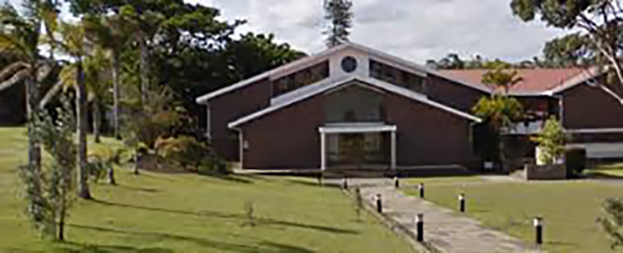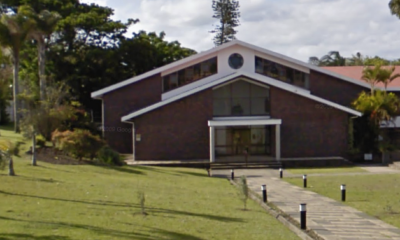
Featured Item

Beth Din retracts ruling absolving East London rabbi
Published
3 years agoon
Back in September 2019, the Beth Din found Rabbi Chanoch Galperin innocent of an allegation by the East London Chevrah Kadisha (ELCK) that he had forged the will of the late Israel Bayer to divert funds from Bayer’s estate originally intended for charity.
The Beth Din has now formally withdrawn and set aside this ruling, and the rabbi has formally admitted that his wife wrote the will, which would disqualify him from benefitting from it unless he is permitted to by an order of court.
The East London community is in a state of limbo as the rabbi continues to occupy the rabbinical home and fight the case related to the disputed will in the Grahamstown High Court.
In a plea to the court dated 23 November 2020, Galperin said he denied that the handwriting on the will in question was his, and admitted that it was that of his spouse, Sara Galperin. He admitted that the Wills Act “disqualifies the spouse of a person who has written out a portion of a will in his or own handwriting”, but asks that the court declare him competent to be the executor of the estate and to benefit from it.
The previous version of Bayer’s will instructed that one third of his estate go to the ELCK, but a later handwritten will in the rabbi’s possession allocates this same third of the estate to him. After a Din Torah (hearing) in September 2019, the Beth Din found the rabbi innocent.
According to the ELCK, during those proceedings, the rabbi refused to inform it who wrote the will when questioned.
According to the Beth Din’s judgement, the rabbi then privately informed the dayanim who had written the will. The Beth Din didn’t reveal this information to the ELCK before it made its judgement.
“The respondent [rabbi] denies having written the handwritten portion of the third and final will … The respondent informed the Beth Din privately who had written the will. This person was questioned on this matter, they confirmed that they did so, and provided the Beth Din with a sample of their handwriting,” says the judgement.
In an affidavit deposed on 1 October 2020, ELCK co-president Louis Robinson said that this handwritten evidence was obtained outside of the formal proceedings. The ELCK was never made aware of the evidence nor asked to comment on it. The first the ELCK heard of it was in the Beth Din’s final judgement.
Robinson alleged that the Beth Din’s decision not to take the Wills Act into account may have resulted in the rabbi benefitting although he was disqualified without a court order. However, the rabbi told the SA Jewish Report that “Halachically, it’s perfectly fine for anyone to write a will for anyone.”
The SA Jewish Report sent questions to Beth Din Dayanim Rabbi Gidon Fox and Rabbi Yoel Smith about this issue. Fox said, “It would be inappropriate and probably legally impermissible for the Beth Din to disclose information which is of a private and confidential nature and which was raised in arbitration before it. Furthermore, we are aware that these very issues have been brought before the high court and the Beth Din wouldn’t want to compromise these proceedings by disclosing any private information which was brought to it before at the arbitration. The Beth Din hasn’t received the permission of the parties to make any disclosures, and the Beth Din is accordingly obliged to regard this information as confidential and private.”
But the advocate representing the ELCK, Stanley Pincus SC, said, “The Beth Din was asked to investigate all aspects of the will, including who wrote it, and failure to disclose the information given to it could have resulted in the rabbi benefitting from the will when he was automatically disqualified without having first obtained a court order to do so.”
On 2 November 2020, the Beth Din’s attorney, Steven Weinberg at Moss Cohen & Partners, stated that the Beth Din’s instructions were that “the ruling which it issued in relation to the last will and testament of Mr Israel Bayer and which is the subject of the review proceedings has been recalled and set aside”.
The letter said this was pending the finalisation of a new hearing in respect of new evidence that has arisen from both sides, and that high court applications in respect of the ruling “are misplaced and premature inasmuch as the ruling has been recalled”.
It went on to say that the Beth Din would be pleased if a settlement could be reached, and it would be happy to assist with further mediation. If mediation and settlement couldn’t be achieved, the Beth Din suggested “that all of the disputes in this matter be referred to an arbitration panel to be agreed upon between the parties for a final determination”. The Beth Din offered to provide this arbitration panel, and to allow each side to “agree on the arbitrators and the rules”.
“The ELCK was given the opportunity to appeal after the ruling, but it refused to come,” Galperin told the SA Jewish Report. However, Pincus said that the ELCK “tendered to go back to the Beth Din if certain conditions were met [new dayanim and legal representation amongst other points], but the rabbi refused to do so because the issue relating to the disputed will had been determined by the Beth Din as per their judgement”. Pincus went on to say, “Only a court can order that the rabbi be qualified to benefit from the will, in light of the rabbi’s admission that his wife wrote out the will. This issue and other issues relating to the disputed will cannot and should not be determined in arbitration proceedings.”
The ELCK continues to fight the case in the Grahamstown High Court, “the main issues being whether the rabbi forged the deceased signature on the disputed will, whether the witnesses signed the disputed will in the presence of the deceased, and whether the court will order that the rabbi be allowed to benefit, notwithstanding that he is automatically disqualified in terms of the Wills Act,” said Pincus.
With the relationship between the ELCK and the rabbi irreparably broken down, and the rabbi refusing to vacate the rabbinical home as per the terms of his dismissal, the community is no longer functioning.
The rabbi was dismissed from his position by the East London Hebrew Congregation after a disciplinary hearing in February this year.
“It has not had services for over a year. This has destroyed the community,” says Rabbi Moshe Silberhaft, the spiritual leader of the Small Jewish Communities Association, who has tried to help out where he can.
“People can’t say kaddish, and they didn’t have yom tov services. Before this dispute, this was a small but fully functioning community, which is why it had a rabbi. They would have Shabbat and shiurim – they were carrying on. But now there is no activity whatsoever.” He hopes to help the community rebuild itself slowly as it moves forward.








